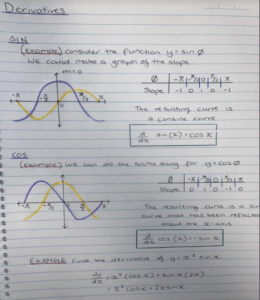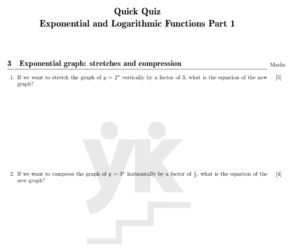
- 7 min read
How to study for HSC Maths Exam - what to do in the weeks, days and hours before

Ian
Ex-tutor & HSC Band 6 All Rounder @YK Education
When you receive the Maths assessment notification, it can be difficult to plan what you should study and what you should avoid.
For example, where should I start? Should I experiment with exam strategies? Should I make Maths notes? Is it fine to do exam papers under non-exam conditions?
All of these questions you may have will be answered in this blog! We will detail a definitive list as to what you should do for an HSC Maths Exam at all times leading up to and during the test. After reading this article, you’ll be better able and more confident to tackle anything that is thrown at you!
Also Read: Tips for choosing the best HSC tutors in Sydney
Article Outline:
- General Tips for your HSC Maths Exam
- How to make notes for HSC Maths and consistently study throughout the term
- Maths notes Type 1: Notes on theory
- Maths notes Type 2: Compilation of exam questions
- 5 steps to prepare for HSC Maths Exam
- When you receive your notification – 2 weeks before
- 5 days before – Consolidate knowledge and focus on exam strategies
- The Night Before
- On the day of the exam
- During the exam
Firstly, here are some general studying tips for your HSC Maths Exam you should already be doing.
- Write Maths notes and review them strategically. We’ll cover this topic more below, but it is crucial that we create understandable math notes. This means key formulas that need to be memorised are written down, and we categorise compiled questions we have gotten wrong in the past into topics for revision.
- Perfect practice makes perfect! This means that you practice exams in timed conditions once you feel confident in your revision of all topics in the assessment. Then, MARK the exam and COUNT the marks to objectively assess where you stand. If you think about it, it doesn’t matter how many exams you do if you don’t mark or are receiving a mark of only 40% in all of them. If you do badly in a practice exam, don’t fret! Redo the past exam until you understand the type of questions completely and get close to full marks.
- Know your exam strategy. Figure out your exam strategy if you haven’t gone through your practice tests or discussions with your tutor. Do you approach exams front to back or back to front? Do you start with the easy questions or the questions with greater mark weighting? Multiple choice or short answers first? The choice entirely depends on what works for you best, so find your style! Chat with your YK Tutor if you need some help with experimenting with exam strategies.
- Be critical and self-reflective. We must have the ability to assess strong and weak topics so we are able to focus our efforts on particular topics that need it more. Ask yourself “Can I do this question by myself in an exam without my tutor?” If you are being honest and feel as if you can’t, ask your YK tutor for assistance or do some more questions!
How to make notes for HSC Maths and consistently study throughout the term

The classroom is the foundation of everything that will be taught, studied and ultimately assessed in the HSC Maths syllabus. In your lessons at YK Education, we’re certain that you’ve written down tips while going through the theory books. It is crucial that you make your own notes so you can easily revise the topics later on, rather than scramble and make it that much harder to study before an assessment.
Wait, you can make notes in Maths? Yes! While Maths may not be the first subject that comes to mind when making study notes, it is no less a subject that does require it.
Type 1: Theory-based notes
Here is an example of what your study notes in Maths may look:

If you notice, there are key formulas and diagrams or graphs and colour is used wherever possible in the notes. This is because humans are simply much better at processing visual images in comparison to text. 60,000X faster to be exact! Writing a blurb of text will only make Maths so much harder than what it actually is. Maths is not like English, and so should your Math notes be as well.
To supplement the key formulas and diagrams or graphs, write out the questions and steps required to solve those questions in words. After all, if you look back at the visuals and can’t even recall what it’s about, is there a point? When formulas + diagrams or graphs are combined with questions and their relevant steps, revising for Maths just becomes that easier and more enjoyable.
Type 2: Question-based notes

Compile a list of questions that you found challenging with worked-out solutions. These can be handwritten or screenshots to save time. Using loose-leaf sheets of paper allows flexibility when organising the questions into topics. This way, you’ll end up with a compilation of questions that you found difficult in the past. Redo these questions to revise the exam topics.
Once you’ve made the notes, you will also need to consider how to approach similar questions. The notes you made are there to make sure you are able to answer future questions you would not have seen before, applying familiar concepts. Sometimes, the question may not even be in a style similar to that in your notes. Typically these questions, so-called curveball questions, combine different topics (think of trigonometry and integration) in an attempt to catch you off guard. Exposing yourself to a variety of exam-style questions and keeping them saved to revise later will definitely help. The second hour in YK Education’s HSC Maths program provides these exam questions.
These ways of making notes is not only supported by science, but also by us too! We encourage all of our students to combine visuals with text when studying for maths, while considering those curveball questions that exams can all so well throw at us, so that they are able to better understand all of their topics. This philosophy is the driving force behind the way that we teach Maths at YK Education.
Okay, now we’re ready to get back to the main topic of this article.
Here are the 5 steps to follow from the moment you receive your HSC Maths assessment notification!
When you receive your notification – 2 weeks before
When you first receive your Maths notification, this will usually happen at least 2 weeks before the actual test. Now 2 weeks is a long time, but it can go by quickly. Here are some things you should do immediately for the next time the dreaded notification comes.
Assessment notification sample

- Understand the exam requirements. Look out for how long the exam is, how your exam is structured, what are the topics included and know what you can take into the exam such as a cheat sheet or a calculator. Too often students skip this simple part of the notification, only to find themselves more pressured when the exam structure and assessable topics are different to the ones they thought of. Familiarise yourself with the parameters of the exam so this doesn’t happen to you EVER!
- Strategically identify weak topics. It is always a good idea to start revising with the topic that has the biggest weightage in the exam, as well as figuring out your strengths and weaknesses with the topics. You can do this by doing each chapter summary or summary quiz at the end of the textbook chapter.

We have summary quizzes too at YK! Each topic will have its own quiz at the start of every YK lesson so everyone can assess how well the student has understood the content taught in the previous lesson.
Now that you have identified your strengths and areas to work on, the next step is to manage your study schedule into realistic manageable chunks. Goal setting helps you focus your time and efforts into areas where you otherwise wouldn’t have been able to get to without it.
Set a particular topic to be revised or studied on certain days, and how much time should go into revising that topic. The tip here is to be as specific as possible. Split the exact tasks to prepare for the Maths exam into 30 minutes to 1-hour chunks.
For example:
- Specific exercises from your textbook
- Write notes on a particular topic
- Redo a YK Maths quiz or topic summary at the end of your textbook
- Do past exam questions on 1 topic
- The final important step is to plan a study schedule, use google calendar or any study plan app that helps make sure you make the most of your time for any Maths exam. This could be scheduling when you do a topic quiz, additional topic revision, or even writing notes. Always make sure you plan ahead of time, and start factoring in when you should start past papers.
2. 5 days before – Consolidate knowledge and focus on exam strategies
In the 5 days before the Maths assessment, here are some things you should do to minimise the stress you have.
Start reviewing your math notes.
By now you would have gone through numerous math questions from past papers or the textbook and hopefully consolidated ones you found initially tricky.
Use different techniques to revise.
- Technique 1: Active recall
If you’ve followed the steps, you should have a compilation of all these tricky questions that you found challenging in the past and the corresponding worked out solutions. Instead of simply sighting the step by step solution of the problem, get your hands dirty and start redoing them! Making a quiz for yourself from all these types of tricky questions may be the most time-efficient way for revision. Keep adding questions as you tackle more practice Maths exams. - Technique 2: Spaced repetition technique
The first is the spaced repetition technique where you memorise and understand certain concepts, repeated over an increasing interval. For Maths, this could be learning how to solve a type of question, solving the question without help in another 4 hours, followed by 8 hours and so on. Basically, this combats the Ebbinghaus forgetting Curve (pictured below).

- Technique 3: Feynman Technique
Explaining new concepts or how to solve certain questions to your friends, the Feynman technique, is a way that shows what you know and don’t know about the topics. If you aren’t able to teach your friends how to solve a question, it shows a knowledge gap somewhere. You can bridge this gap either by further revising, or simply seeking assistance from your teacher or YK tutor. Do not ever be afraid of reaching out!
The only thing left to do now is to work on your exam strategies.
- Get used to doing past papers under timed conditions and marking them after. Timed conditions make for more stress which can result in careless mistakes that you don’t realise until after the test.
- Have a plan of what you can do to minimise these mistakes coming from stress. This could be experimenting with highlighters and coloured pens to identify the question clearly, employing a certain breathing technique to avoid mind blanks.
- Another area you could lose marks in is neatness and presentation of your working, so make sure this does not happen to you! If you feel as if your working is like a dog’s breakfast, it doesn’t hurt to spend some extra time making it look better.
- Lastly, be critical rather than generous in your marking. This allows you to add up the marks and see exactly where further improvements could be made.
3. The Night Before
At this point, stress will be at its highest point. You have already studied as much as you could have, so only review your theory and question notes.
Rest and relax your brain. Just as an athlete would not do any strenuous exercise before game day, don’t attempt any new past papers as tempted as you are. It could only serve to demoralise you if there are certain questions you are unsure of solving. You should also do the following before the big day.
- Sleep well. Ideally, you would aim for at least 8 hours of sleep so that you are able to function better.
- Make sure you have all the relevant materials for the test, such as x2 scientific calculators, x3 black pens, etc. Don’t forget the cheat sheet if you are allowed to bring one!
- Read through your notes, paying particular attention to the formulas, diagrams and graphs you have. Try to do a quick recall test before you hit the hay.
- Reassure yourself you have studied and prepared well for this test, do not let that all go. Remember your YK Family
4. On the day of the exam

This is it, game day!
- Eat a good breakfast and drink plenty of water. This will improve your brain function and memory so that any question the test may throw at you doesn’t create the dreaded mind blank.
- Also, have a last read through your notes that has all the formulas, diagrams and graphs related to the assessment. It does give that little bit of extra confidence and reassurance which always helps before a test!
5. During the Exam
Now it’s exam time. Nerves, adrenaline and everything in between is being felt.
- Read the questions in the test carefully, going through each question and identifying which may take longer to do. Use the reading time well, read ALL the questions instead of reading the few and trying to solve them in your head. Of course, it may seem counterintuitive that solving the questions will waste time, but there will undoubtedly be a question that will stump you later on in the paper. Seeing that question in reading time will ensure your confusion doesn’t last as long as it needs to be.
- Recall the mistakes you made during your revision and apply that to each question you do. This is particularly important for careless mistakes, such as making a rounding error, forgetting to put units in the final answer, etc. If you ever get stuck on a question, check its mark allocation. Whether it be a one or five marker question, if you are spending more time than necessary for the marks on offer, circle the question, skip it, and come back to it later. Time is everything in an exam, don’t let that one question derail your whole test!
So that’s it!
We have talked about what you should do from 2 weeks before to during your HSC Maths test. If you have any steps you have for exam prep that aren’t here then consider adding them onto our expansive list. We are sure that each step outlined will allow you to do the best you possibly can.
Summary: How to study for your next HSC Maths Exam
5 steps to prepare for HSC Maths Exam:
- When you receive your notification – 2 weeks before
- Read the notification carefully
- Identify knowledge gaps
- Start writing Maths notes with theory-based content and question-based content
- 5 days before
- Consolidate knowledge by finalising Maths notes
- Focus on exam strategies
- The Night Before
- Sleep
- Read through Maths notes and questions that were incorrect in the past
- On the day of the exam
- Eat well and drink water
- Read through Maths notes
- During the exam
- Believe in yourself, read the questions, avoid careless mistakes
All the best!
Also Read: How to Stop Procrastinating
Get more study tips
Receive monthly study tips and educational content that will help you ace your final years of High School!
Thank you!
You have successfully joined our subscriber list.
